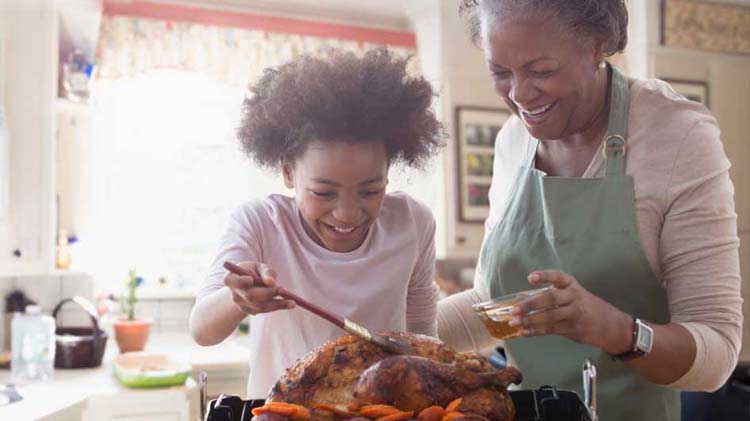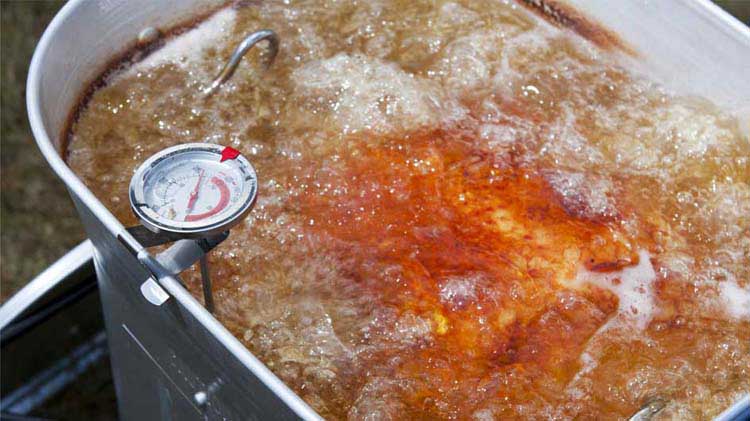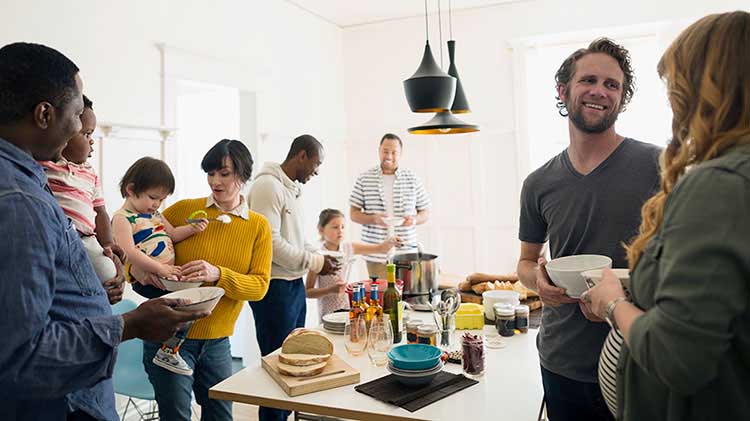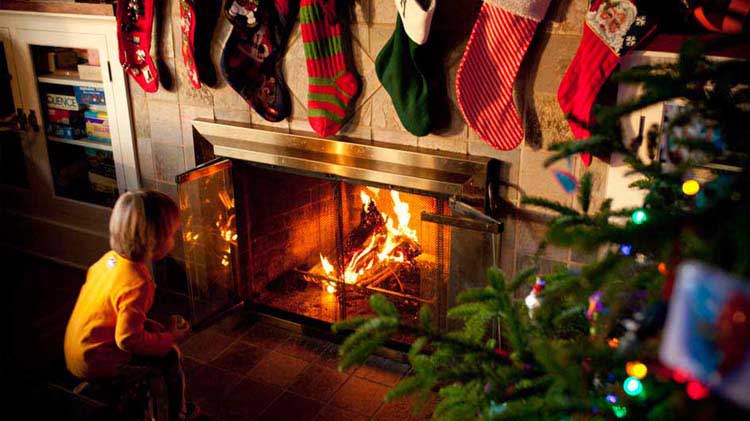Thanksgiving turkey cooking time, temperature and tips
Learn some food preparation and safety tips and what temperature to cook a turkey to help make your Thanksgiving a memorable one.
Thanksgiving can be the perfect time to share meals with family and friends. See that your guests leave with joyful memories and delicious leftovers by following these Thanksgiving food safety tips.
Turkey preparation
There are many things to consider before starting your Thanksgiving cooking. Consider these tips before putting the bird into the oven or fryer:
- If you're buying a frozen turkey, allow enough time to completely thaw. If you purchased your frozen turkey early to avoid the grocery store frenzy, try to cook it within seven months of purchasing.
- If opting for a fresh turkey, purchase it no more than two days before you're planning to cook it.
- When it's time to thaw your turkey, take the proper precautions and do not thaw at room temperature. There are a few different ways to safely thaw your bird including:
- Refrigerator – leave the bird in the original wrapper and place it breast-side up. See that the refrigerator is not above 40 degrees Fahrenheit and allow one day of thawing for every four pounds.
- Cold water – put the turkey in a leak-proof bag and allow about 30 minutes per pound.
- Microwave – follow your microwave manufacturer’s instructions.
According to the USDA, it’s best to cook a refrigerator-thawed turkey within 2 days after thawing, and a microwave or cold water-thawed bird immediately.
- To brine or not to brine. If you're on team brine, you'll need to account for the brining time and use a meat thermometer to ensure your turkey is brining at a safe temperature of 40 degrees Fahrenheit or less.
- Consider a meat thermometer. You can't always rely on the pop-up thermometer or checking to see if the juices run clear.
You can find additional tips from the Butterball turkey hotline.
Keep your food prep area clean
When it comes to food safety, it's important to keep the work space sanitary and your hands clean. We have a few pointers for your Thanksgiving meal prep.
- Wash hands well. Scrub hands with soap under warm water for 20 seconds. Do the same after handling food, especially raw meat or poultry, to help avoid cross-contamination.
- Dry your hands. Have multiple hand towels available or consider using paper towels for this event.
- Prepare your workplace. Clean counters, cutting boards, dishes and utensils with hot water and soap before and after preparing each food item.
- Do not bathe your bird. Rinsing or washing your turkey prior to baking can increase the chance of passing new bacteria to the turkey.
- Help prevent cross-contamination. Keep other foods away from the raw turkey and use separate utensils.
Heat foods to proper temperature
The cooking temperature for your turkey will vary based on the recipe you're following. However, if you don't have a favorite go-to recipe, 325 degrees Fahrenheit is a good temperature to cook a turkey. Keep in mind that turkey cooking times and temperatures will be determined by the weight of the turkey and if it's stuffed or unstuffed. Here are a couple other things to consider when cooking your turkey:
- Color is not a reliable indicator of safely cooked food. Use a food thermometer to make sure meat, poultry and fish are cooked to a safe internal temperature — typically at least 165 degrees Fahrenheit.
- Test the internal temperature in at least three areas on a turkey: the thigh, the wing and the thickest part of the breast. According to Butterball, the turkey thigh should be 180 degrees Fahrenheit and the breast should be 170 degrees. If the bird is stuffed, verify the stuffing is 165 degrees.
- Frying your turkey? Follow our turkey fryer safety tips.
How to carve a turkey
Once the turkey is fully cooked, consider these carving tips.
- Let the turkey rest. It’s helpful to let your turkey rest for about 20 minutes or more to settle the juices and make it easier to carve.
- Sharpen your knives. Using a sharp knife will make cutting meat easier.
- Carve the turkey. With the knife resting between the breast and a leg, slice down with even cuts until the leg portion is removed. Then you can cut the wing away. For the breast, start at the top, slightly to the side of the bone, and slice off the entire breast with long even strokes. Once the breast is removed, lay it horizontally and slice the pieces vertically. When all the individual breast pieces are cut, you can slide your knife underneath to transfer the pieces to the platter for a nice presentation.
Safe food temperatures
One of the best things about holiday meals is the abundance of food for guests to graze on throughout the day. Even after food is cooked, it's important to maintain food safety.
- Keep hot foods at 140 degrees Fahrenheit or warmer with chafing dishes, slow cookers and warming trays.
- Keep cold foods at 40 degrees Fahrenheit or colder. Nest serving dishes in bowls of ice and store moist desserts, such as pumpkin pie and cakes with whipped frosting, in the refrigerator until serving.
Time to eat
- Serve small portions. Keep any extra food warm in the oven or cold in the fridge to help prevent spoiling.
- Consume leftover food within three to four days. If you're looking to stretch your turkey for a longer period of time, store the leftovers in the freezer for up to four months.
- When reheating your food, use a microwave or oven to reheat foods to an internal temperature of 165 degrees Fahrenheit.
Store Thanksgiving leftovers safely
- Don't keep your food out. After you've enjoyed the feast, consider putting your leftover goodies into the fridge. According to the CDC, food shouldn't be sitting out for more than two hours.
- Remember to remove the stuffing from the turkey cavity prior to storing.
- Divide leftovers into shallow containers. This allows for rapid cooling before storing in the refrigerator or freezer.
- Preserve your food. If you're traveling two or more hours away with your leftovers in tow, store the food in a cooler with ice packs.
Since holidays can be a time to reconnect with family and friends, discover more tips to help stay safe this holiday season.




